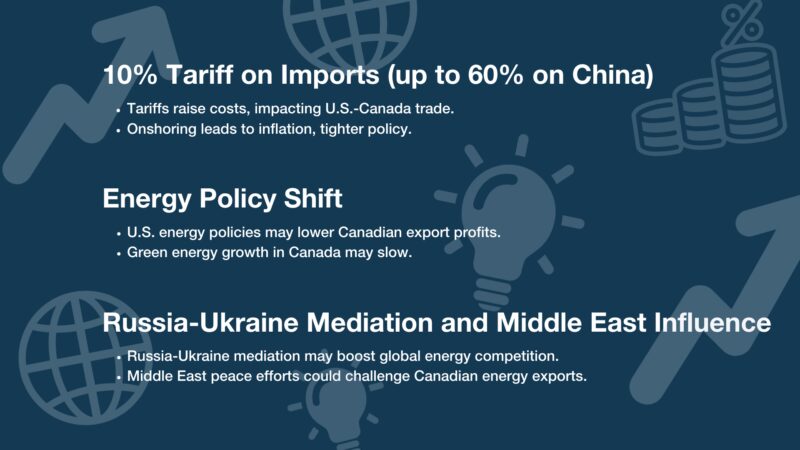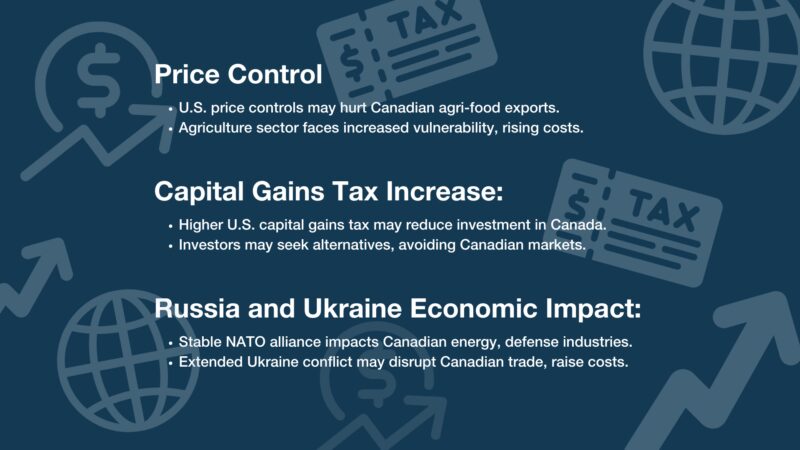What the U.S. Election Means for Canadian Business Owners
Reading Time: 4.5 minutes
The upcoming U.S. elections hold global significance, particularly with the neighbours to the north, our Canadian economy. Much of our economy is dependent on the U.S., so, understandably, we follow their politics closely.
A change in government can have implications for business leaders, and in this blog we will outline two alternate possibilities based on the outcome.
Trump’s Policies and Impact on Canadian Businesses:

Anti-Illegal Immigration and Potential Influx into Canada:
Trump’s anti-illegal immigration policies may push some to seek refuge in Canada, particularly those fearing deportation. Canada’s immigration and refugee systems may face strains. Businesses could see both challenges and opportunities with labour supply.
In industries with labour shortages, such as professional, scientific, and technical, this could provide a short-term boost, but only if training is readily available. However, the social infrastructure may not be ready for many migrants. More immigration could add to the housing crisis and unemployment rate, which both carry many economic implications. Many informally refer to this double-edged sword as the population trap.
10% Tariff on Imports (up to 60% on China):
The new tariffs on imports, especially the high tariffs on China, may raise prices for American consumers and affect trade globally. This could create opportunities for Canadian companies to export more competitively priced goods to the south.
However, Canada will face tariffs too, probably around 10% on exports to the U.S., potentially harming sectors like automotive, agriculture, and manufacturing. Overall, these tariffs may lead to less trade with our primary trade partner, the U.S. The outcome could be higher inflation and tighter monetary policy for the Canadian economy as the U.S. leans toward onshoring its manufacturing. Canada will likely impose tariffs on the U.S. in return, which will encourage onshoring and competition within our borders but lead to price and wage inflation as well.
Anti-Abortion and Repercussions for Canada:
If the U.S. restricts abortion access, many American women may seek reproductive healthcare in Canada. This could create opportunities for Canadian healthcare providers, but may also increase demand, straining resources. It could also ignite political and ethical debates within Canada on how to manage this increased demand.
Energy Policy Shift:
Trump’s support for oil and gas could put downward pressure on North American energy prices, affecting the Canadian economy via profits on exports. Another scenario could be a boost in energy-related cooperation, reigniting foreign investment in Canada’s energy sector.
These policies could also affect Canada’s investment in renewable energy technologies. The global focus on reducing carbon emissions may wane under a Trump administration. Canadian companies in the green energy sector may lose market opportunities or face slower growth in collaboration with the U.S.
Reduced NATO Support and Canada’s Global Reputation:
If Trump pulls back support from NATO, Canada’s own international standing and its defense partnerships could be jeopardized, as the U.S. is its key ally in global defense. This might force Canada to increase its defense spending or pivot to new alliances, creating political and economic uncertainty that could ripple across sectors like the aerospace and defense industries.
Russia-Ukraine Mediation and Middle East Influence:
Trump’s willingness to help mediate between Russia and Ukraine could reduce tensions in the area. This may lead to free trade again, which could impact global energy prices. For Canada, this could mean more competition in oil and gas exports as Russia’s energy products return to the market.
Trump’s influence in the Middle East, through efforts like the Abraham Accords, could help promote peace. However, it may also increase competition for Canada in exporting energy to those areas.
Tax Cuts:
The Trump administration’s proposed tax cuts for individuals and businesses may create a better business environment in the U.S. This could encourage companies to move or grow their operations there. As a result, Canada might see less investment coming in.
Kamala Harris’ Policies and Impact on Canadian Businesses:

Lowering Prescription Drug Prices:
Harris’ plan to lower prescription drug prices, and healthcare more generally, in the U.S. may affect Canadian drug companies. This could lead to price pressures or lower profits. However, it could make U.S. healthcare cheaper for Canadians working across the border and help Canadian companies with U.S. operations that provide healthcare benefits.
Affordable Housing and Tax Credits:
Harris’ plans to increase housing supply and provide tax credits for first-time buyers could spike in housing construction across the border. This might be an opportunity for Canadian exporters, particularly those in raw materials and products such as housewares and furniture.
Lumber, steel, and energy exports could increase as well to keep up with building demand. The Canadian economy and communities would happily benefit from this change; although, forestry and conservation efforts would ramp up as well. More investment from federal and provincial governments to protect forests and natural environments would be required to offset clear-cutting, mining, and extraction initiatives.
Price Control:
The price-controlling goods, with a focus on groceries, could affect Canadian food exporters. Currently, the U.S. accounts for 60% of all our agri-food exports, about $90 billion. This includes commodities such as canola, wheat, dairy, vegetables, cattle, and potatoes. If the U.S. sets price limits on food products, Canadian farmers and exporters may struggle with pricing, which could create ripple effects throughout our economy. As a result, the agricultural sector may become more vulnerable, and related food product industries may incur increased expenses for raw materials.
Tax Benefits for Families and Childcare:
Harris’ proposed tax benefits for families include $3,600 per child and $6,000 for a child’s first year. These benefits could increase consumer spending in the U.S. This would especially help Canadian companies that sell consumer goods or family products in the American market, in sectors like retail, baby products, and consumer electronics.
Capital Gains Tax Increase:
Raising capital gains taxes for high-income earners in the U.S. may change how they invest, making them more risk-averse. This could lead to less foreign direct investment from the U.S. into Canadian companies, which is already strained due to high corporate taxes and unfavourable business environments. As a result, American investors and companies may further try to reduce their exposure to Canada’s marketplace.
Alternatively, it could encourage investors to look at other options when deploying their capital, depending on how high the capital gains tax increases.
Inflation Reduction Act and Stimulus Continuation:
Kamala Harris’ policies are expected to build on the Biden administration’s inflation reduction initiatives, which may indirectly benefit Canadian businesses involved in clean energy and industrial sectors. Harris’ focus on social programs and consumer relief could lead to less focus on industrial subsidies, which might slow growth opportunities for Canadian exporters of goods related to manufacturing and industrial supplies.
Increasing consumer relief may also encourage spending among American consumers, which may help Canadian exporters in the consumer goods sectors.
Russia-Ukraine War and NATO Support:
Harris will likely follow Biden’s policies in their involvement with Ukraine and NATO. While there may be no significant changes or de-escalation, the alliance with NATO will remain unchanged and stable. This affects Canadian businesses involved in global trade, especially in industries like energy, defense, and manufacturing. Particularly Canada’s oil and gas could face fluctuating demand and competition if the war drags on, as sanctions on Russia continue to reshape global energy markets.
Canada may also face increased costs for supporting NATO and international security efforts, which could impact defense-related industries or those relying on European markets. Additionally, potential disruptions to global supply chains because of extended conflict may indirectly affect Canadian imports and exports.
To summarize the most notable changes, imposed tariffs would generally hurt the Canadian economy, and continued global tensions and war could have long-term outstanding effects on us as well.
Politicians’ policies are sometimes just signifiers of what they stand for. Often it is “more talk than walk”. That said, we can look at their policies as a hint at what lies ahead if they win the election. Both Trump’s and Harris’ policies will influence Canada’s economic landscape, particularly in sectors like energy, healthcare, trade, and investment. Understanding these nuances will be essential for Canadian businesses as they navigate the evolving political environment in the U.S.
If you’re looking for support for making business decisions amongst all these changes, consider joining a non-competitive peer group of business leaders facing similar challenges.


